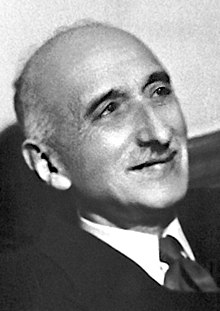François Mauriac
French writer (1885-1970)
François Charles Mauriac (11 October 1885 – 1 September 1970) was a French author; member of the Académie française (1933); laureate of the Nobel Prize in Literature (1952). He was awarded the Grand Cross of the Légion d'honneur (1958). He is acknowledged to be one of the greatest Roman Catholic writers of the 20th century.


Quotes
edit- Ce qui fait le poète, n'est-ce pas l'amour, la recherche désespérée du moindre rayon de soleil d'autrefois jouant sur le parquet d'une chambre d'enfant?
- What makes a poet is, surely, the love of these things, a desperate search for the tiny ray of sunshine which used to flicker on the floor of a child’s bedroom.
- Préséances (1921), cited from Oeuvres romanesques, vol.1 (Paris: Flammarion, 1965) p. 301; Gerard Hopkins (trans.) Questions of Precedence (London: Eyre & Spottiswoode, 1958) p. 46.
- Le mythe de Prométhée signifie que toute la tristesse du monde a son siège dans le foie. Mais qui oserait reconnaître une vérité si humble?
- The myth of Prometheus means that all the sorrows of the world have their seat in the liver. But it needs a brave man to face so humble a truth.
- Le Nœud de vipères (1932), cited from Oeuvres romanesques, vol. 2 (Paris: Flammarion, 1965) p. 166; Gerard Hopkins (trans.) Knot of Vipers (London: Eyre & Spottiswoode, 1951) p. 151.
- On atteint aisément une âme vivante à travers les crimes, les vices les plus tristes, mais la vulgarité est infranchissable.
- One can touch a living soul through a curtain of vice and crime no matter how dense and dark: but vulgarity is an insurmountable barrier.
- Le Nœud de vipères (1932), cited from Oeuvres romanesques, vol. 2 (Paris: Flammarion, 1965) p. 190; Gerard Hopkins (trans.) Knot of Vipers (Harmondsworth: Penguin, [1951] 1985) p. 193.
- Presque tous les hommes ressemblent à ces grands palais déserts dont le propriétaire n'habite que quelques pièces; et il ne pénètre jamais dans les ailes condamnées.
- Most men resemble great deserted palaces: the owner occupies only a few rooms and has closed off wings where he never ventures.
- Journal, 1932-1939 (Paris: Table ronde, 1947) p. 6; Adrienne Foulke (trans.) Second Thoughts (Plainview, NY: Books for Libraries Press, [1961] 1973) p. 142.
- Où finit la correction? Où commence le martyre? Dans l'entre-deux, des milliers d'enfants peuplent un enfer qui ne fait pas de bruit.
- Where does discipline end? Where does cruelty begin? Somewhere between these, thousands of children inhabit a voiceless hell.
- Journal, 1932-1939 (Paris: Table ronde, 1947) p. 278; Adrienne Foulke (trans.) Second Thoughts (Plainview, NY: Books for Libraries Press, [1961] 1973) p. 148.
- Il s'en est fallu de très peu que les larmes de Judas ne fussent confondues, dans le souvenir des hommes, avec celles de Pierre. Il aurait pu devenir un saint, le patron de nous tous qui ne cessons de trahir.
- Very little would have been needed for the tears of Judas to be allied in the memory of mankind with those of Peter. He might have become a saint, the patron of all of us who constantly betray Christ.
- Vie de Jésus (Paris: Flammarion, 1936) p. 257; Julie Kernan (trans.) Life of Jesus (New York: David McKay, [1937] 1951) p. 223.
- J’aime tellement l’Allemagne que je suis heureux qu’il y en ait deux.
- I love Germany so much I'm glad there are two of them.
- As quoted in The Rough Guide to Germany (2004) by Gordon McLachlan, p. vii.